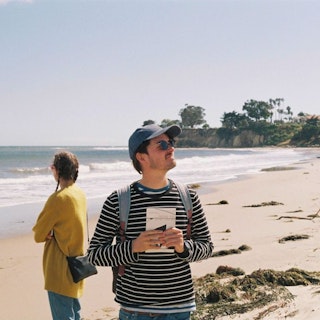‘I founded Media Bounty out of necessity’: Jake Dubbins on ethics and calling out bullshit
Jake Dubbins is managing director of Media Bounty, a London-based agency he co-founded back in 2008; he’s also co-founder and co-chair at ethical ad coalition the Conscious Advertising Network. We sat down with Dubbins to talk wearing two hats, founding an agency “out of necessity,” and what sustainability could look like in an industry dependent on consumption.

Media Bounty’s Jake Dubbins tells us about finding purpose in his agencyland career / John O'Nolan via Unsplash
Jake Dubbins, co-founder of creative and media agency Media Bounty, tells The Drum that the agency was founded “out of necessity.” He means that quite literally: he and two colleagues (including Media Bounty’s now-HR director Emma Tozer and Matt Webster, who was part of the journey for the first nine years) found themselves without jobs when agency EMR folded in 2008. Right at the height of a global financial crash, new work was hard to come by, so the trio decided to start their own agency instead.
They were able to take on clients from the now-defunct agency, and set up the business with personal loans. They sublet a small Camden office from another company, until that operation went bust; thereafter, “we effectively squatted there” until the building landlord eventually repurposed the property and gave them a more permanent home.
The agency focused in its early days on radio PR, and has since branched out into creative and media work focused on climate and ethics. In the early days, Dubbins says, he was cautioned against putting sustainability at the heart of Media Bounty’s offering, positioning instead as a “brand entertainment agency,” but the agency always had its eye on ethical commerce. Since its very first project, it has donated a portion of its fee to The World Land Trust, a project for environmentally-threatened land set up by the recently deceased and much-loved conservationist John Burton.
“This has always been us,” says Dubbins. “It was us from day one, but either we didn’t have the confidence or the knowledge, or we were advised in a different way to kind of present ourselves in a different way than was true to what we were trying to do.” It evolved from “brand entertainment agency” to “creative social media agency with a conscience”; now, the line is “on our journey to be the leading independent creative and media agency” – which fits Dubbins much better.
There are, of course, other players in that space; Dubbins says that he’s delighted to see so much growth – but he does reserve some scorn for astroturfed sustainability-focused agencies spinning out from larger offerings that continue to work with major polluters: “It’s like talking out of both sides of your mouth. It’s inauthentic and bullshit. Either do it all, or don’t do it at all.”
‘Radical pragmatism’
Dubbins’ personal journey might be described as giving more power to that internal voice willing to call bullshit. “A few years ago, I was sitting in meetings going, ‘I don’t give a fuck about this.’” Working on “pure consumption” briefs wasn’t cutting it; “I was like, ‘God, this is a ball and chain, how can I get out?’” Rather than get out, he stuck it out, using the agency as a platform to get involved in “market transformation; food; decarbonization ... the stuff that makes a genuine impact beyond consumption.”
When the rubber of ideology hits the road of reality, of course, compromises have to be made – especially when you’re an employer responsible for people’s salaries. “What I don’t want to do, in an agency where we look after our people, is go, ‘yeah, we’ve decided to turn down every single brief that comes our way and therefore, sorry, you’re all out of a job.’”
Balancing the need to pay salaries with the industry’s role in the existential threat of catastrophic climate change isn’t an issue we’ll solve here, but it is one that Dubbins spends a lot of time thinking about. The good news is that having a clear, loud ethical stance now attracts both clients and talent: “For an agency our size, we’re getting better talent than we might have thought, because people like working for the big names often. There are clearly bigger names, much more glamorous names than us. But the work that we do, what we stand for, is increasingly attracting very talented people to come to us, and stay with us.”
That work includes some high-profile and effective stunts, like buying up every inch of available out-of-home (OOH) ad space in Glasgow and Edinburgh a year ahead of Cop26 to prevent greenwashing from fossil fuel companies.
Bringing the outside in: what advertisers CAN do
Dubbins’s other main hat is as co-founder and co-chair of the Conscious Advertising Network (CAN). That founding story is decidedly less jubilant: Dubbins’ Turkish neighbor was brutally attacked by white nationalists, prompting Dubbins to research the media’s role in hate narratives. The prognosis was not good. He and co-founder Harriet Kingaby set the initiative up in coffee shops in 2018, “roping in anybody who would help us” and organizing around six manifestos, concerning ad fraud, diversity, informed consent, hate speech, children’s wellbeing and mis-/disinformation. It now boasts 70 organizational members, including major global players such as GSK.
“We used to talk about CAN becoming obsolete,” Dubbins says. “I think that was pretty naïve, to be honest.” The problems it addresses remain very real, but it has had some successes – for example, working with Snapchat on its racism and hate speech policies; and co-writing Google’s climate misinformation policy.
“Advertising generally is very good at talking to itself and telling itself how good it is,” says Dubbins. But the present task consists in breaking out of that echo changer, and engaging changemakers from outside too: “Bringing the outside into advertising – civil society groups, affected communities and charities.
“That’s what makes it interesting, because these are languages and sets of people that don’t usually talk. The kind of language of marketing and advertising is very different to the language of human rights. That’s what I find really interesting: how do we learn each other’s languages?”
Content created with:

Media Bounty
We’re Media Bounty. And we’re working to become the UK’s leading ethical independent creative agency by 2026.
Our team delivers award-winning strategy,...

